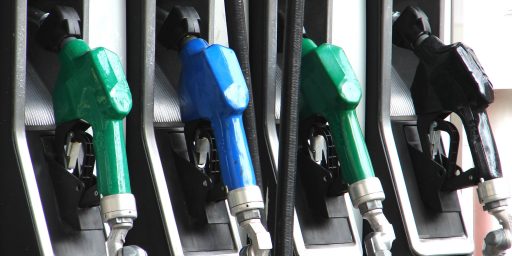Biodiesel Pirates Stealing Grease to Make Fuel
MSNBC reports on a growing number of thefts of used cooking oil from restaurant by “biodiesel pirates”, who convert the cooking oil into fuel.
Now, restaurants from Berkeley, Calif., to Sedgwick, Kan., are reporting thefts of old cooking oil worth thousands of dollars by rustlers who are refining it into barrels of biofuel in backyard stills.
“It’s like a war zone going on right now over grease,” said David Levenson, who owns a grease hauling business in San Francisco’s Mission District. “We’re seeing more and more people stealing grease because it lets them stay away from the pump, but it’s hurting our bottom line.”
[…]
In the last three years, the price of soybean oil — the main feedstock for biodiesel made in the United States — has tripled. Last week, a gallon of crude soybean oil fetched 66 cents on the open market, according to the National Biodiesel Board.
Those kinds of numbers have encouraged biofuel enthusiasts to plunder restaurants’ greasy waste, and have even spurred the City of San Francisco to get into the grease-trap cleaning business.
One imagines that you’re going to see more of this as gas prices continue to rise–both the thefts of grease to sell on the market, as well as more biodiesel “moonshiners” making fuel on the cheap by avoiding regulation.






The resale market for used grease is growing fast enough that it brings the economic assumptions used by those touting using scrap as a source for fuel into question. That was pointed out years ago. Although using the scrap is thrifty there isn’t enough of it that it will be a substantial part of the total energy picture.
We’re going to have to face the fact that if biofuels are to be a big part of our energy future it will be from crops grown expressly for the purpose.
I’d be interested to see estimates of how much biofuel could be produced from the biomass produce by an average household. Maybe homebrew kits could be economically viable for some people.
Mike;
Nah, ‘fraid not.
Most households don’t turn out enough in the way of mass for the stuff. One of the auto shows on Pike did a bit on one of those home brewers. You put in (for example) 15 gallons of cooking oil and get something less tha 15 gallons out of it, with filtration and whatnot. Plus the chem treatments aren’t all that cheap. Even assuming you get the basic components for free because you’ve got a restaurant willing to give you a steady supply of use cooking oil from their fryer, (Which as Alex points out, can be problematic, and I think will be increasingly so) the costs for the mixing treatment chems will end up running on the order of a buck a gallon. Of course the still/mixer ends up running a few thousand.
Sorry, I don’t see it.
Um, how, exactly, is old used waste cooking oil “worth thousands of dollars”? Were the restaurants selling it for fuel themselves? If so, more power to the “rustlers,” who are probably doing a more efficient job than the corporate fatcats. What were the “grease-hauling businesses” doing with it, and why would anyone pay to have grease hauled away when someone will do it for free, and make good use of it? This isn’t theft — this is capitalism at its best.
And if soy and corn prices keep going up to “meet demand” (artificially created), more and more people will realize that there’s a cheap weed that grows practically everywhere, needs no pesticides, can provide oil as well as livestock feed, fiber for clothes and paper, as well as a wide variety of medicines: HEMP.